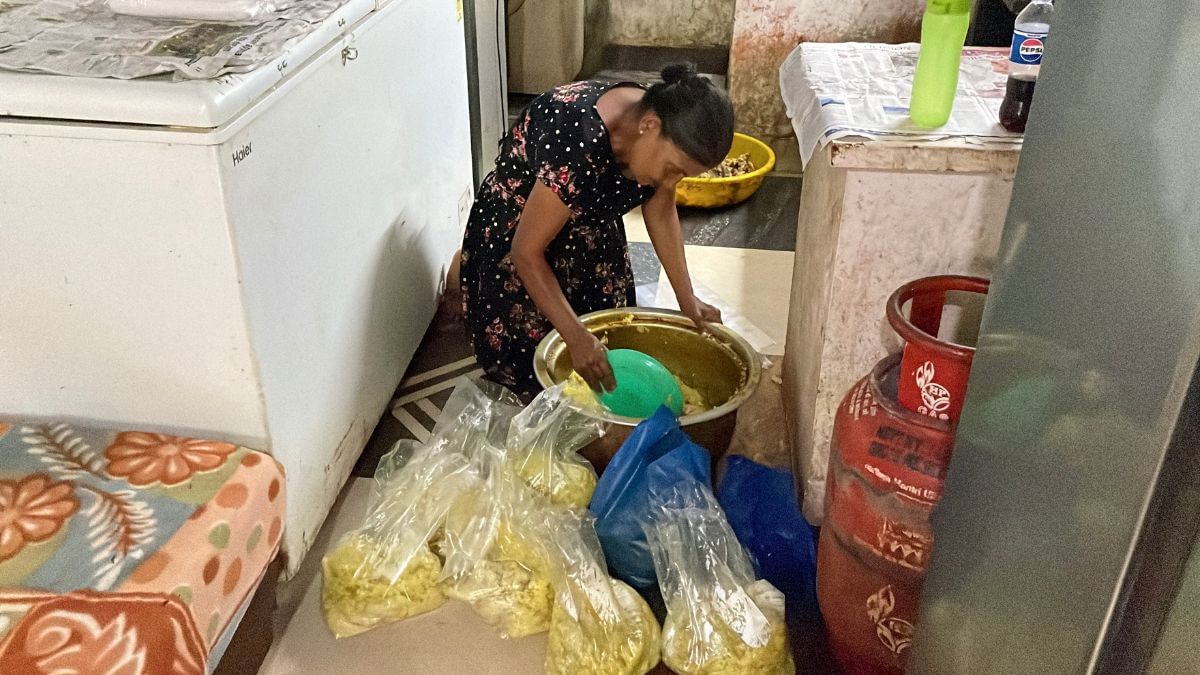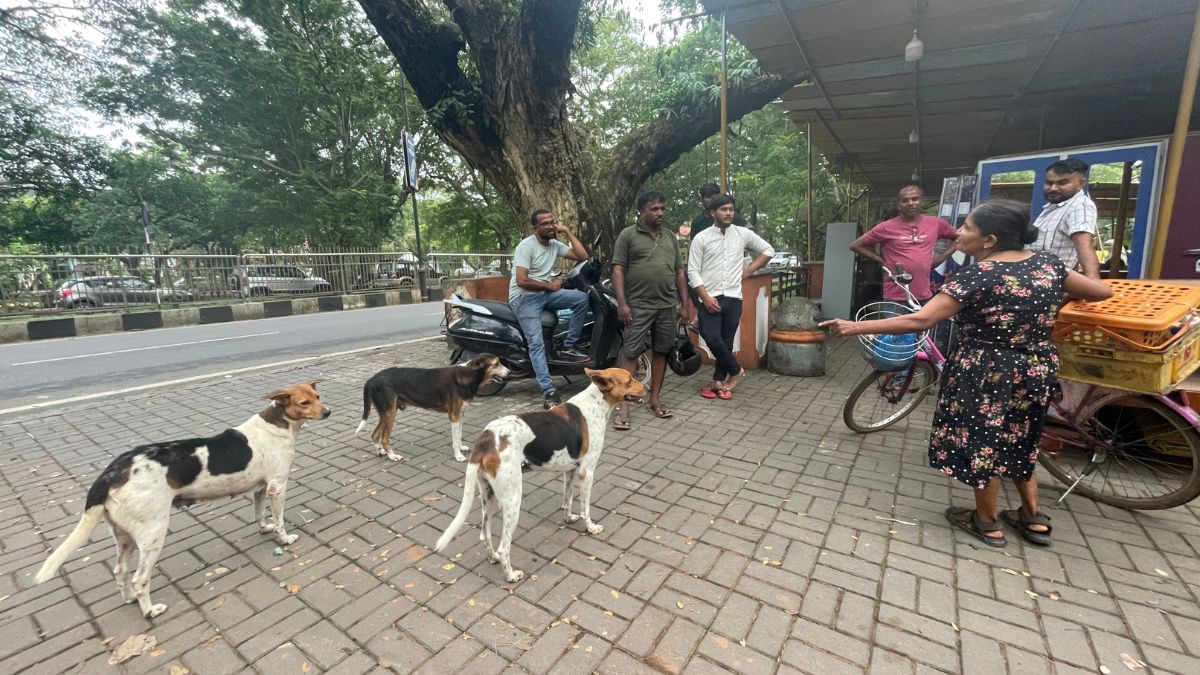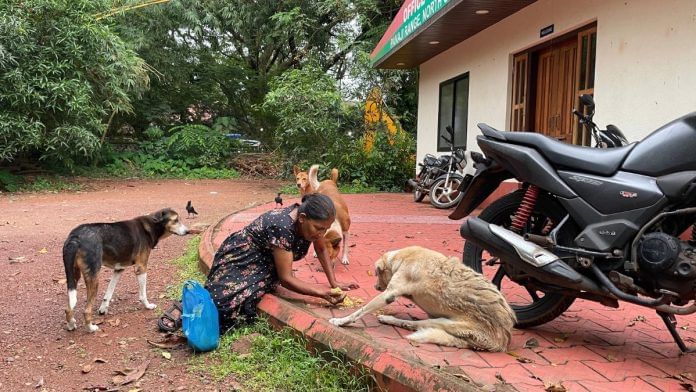Last week, while India’s top court was busy criminalising Delhi-NCR’s community dogs, 55-year-old Maria Gomes was being a busybody on Panjim’s streets. Like every evening, Gomes loaded 30 kilos of rice and chicken onto her bicycle, checked her stoves one last time, and set off on her evening round to feed over 300 street dogs she knows by name. If the order had come into force and were she in the capital, Gomes would have been held in contempt of court.
Instead, she’s here in Goa, where I’m trailing her to understand what drives someone to dedicate their entire existence to feeding animals that half the country wants eliminated. The answer, though, isn’t as tidy and straightforward as what you’d expect from someone the law could soon consider a public nuisance.
In housing societies and neighbourhoods across urban India, feeding community dogs has been a battleground for years. Despite several rulings in favour of community feeders, residents damage food and water bowls, threaten feeders, and hit the dogs at sight. Anyone who chooses to challenge this behaviour is routinely told to take their compassion—and community dogs—inside their own houses, rather than shared spaces.
The 2023 Animal Birth Control Rules attempt to tread the fine line between animal welfare and concern for people by designating feeding areas away from staircases and playgrounds, but the underlying tension never seems to disappear. According to the ABC rules, a dispute resolution mechanism must involve “the chief veterinary officer, representatives of the police, the district Society for Prevention of Cruelty to Animals, organisations conducting animal birth control, and the RWA.”
That baby went out with the bathwater as soon as the Supreme Court’s observations came in. Despite the almost instantaneous stay on the order, reports of its misuse have already begun to filter in from across India. In a country that constitutionally mandates kindness to animals, practising it is treated as a crime.
Also read: Dogs were adored in medieval India. They saved cows from asuras, fought boars & tigers
The origin story
A pervasive notion about these debates is that these are middle-class and elite concerns, as if a love for street animals is the preserve of the affluent alone. That notion crumbles the moment you step into Maria Gomes’ world.
When I arrive in the evening at her two-room rented home in Miramar, she’s already in motion. Gomes is diminutive and missing a few teeth, but doesn’t miss a beat, shuttling between her kitchen and bedroom, dodging a menagerie of cats, chickens, and turkeys crawling around the yard. After all, she’s been doing this for 12 years.

The only modern conveniences I can find in Gomes’ home are the spick and span deep freezers and fridges that line the walls of both rooms. Inside, the air is thick with the smell of turmeric, rice, and boiled chicken. Gomes cooks all day long for her furry friends, and undertakes two rounds: The first at 5 am, when she takes an autorickshaw around and makes 22 stops; the second at 5 pm, on her little bicycle. Thirty kilos of chicken and rice are apportioned into multiple packets. Some of the dogs, she told me, eat only chicken, some only rice, some can only eat liver and rice, while some are just plain choosy. She also packs a portion of nibbles that she can throw the way of dogs that follow along.
In a different life, Gomes’ skills could have easily helped run a military kitchen or a restaurant. Instead, here she is, orchestrating a daily operation reliant completely on donations from well-wishers.
Gomes learnt the unspoken rules of coexistence on the streets. She was born an orphan, and from the age of six, she worked as a domestic worker. In her twenties, Gomes went on to work in a food factory for 17 years, followed by six years in a shop and later at a shelter. By 2011, however, despite having worked her entire life, Gomes found herself sleeping on Panjim’s streets.
It was during those three years of homelessness that her relationship with the city’s dogs began. The strays would bark at her in the darkness, so she started feeding them biscuits so they wouldn’t attack her. After multiple Covid-19 lockdowns, when employment became increasingly elusive, Gomes decided to take the leap and dedicate her life entirely to feeding community animals. “I have been bitten by dogs four times,” she told me. “That doesn’t mean I hate them. They are also part of this planet. You cannot get rid of them. It is their land also.”
This origin story cuts through every comfortable opinion about animal welfare. Gomes wasn’t—and isn’t—extending compassion from a position of middle-class stability. Instead, it emerges from the intimate knowledge of what it means to exist at society’s margins, to understand abandonment not as a concept but as lived experience.

Gomes loads her bike, and sets off, bidding goodbye to a couple of dogs that hang around her street. She whizzes past cars and bikes at a steady clip, expertly negotiating the potholes, while throwing pieces of chicken at the dogs that fall between her stops. Wherever Gomes goes, the dogs seem to find her, emerging from doorways and alleys. Her first stop is at a schoolyard, where the watchman sweeps up a portion of the ground, clearing space for her to feed the dogs. The second is in a clearing by the side of Panjim’s main road, away from pedestrian and motor traffic. That doesn’t stop the passing walkers from staring and shooing at her.
This is what people miss about the complexity of Gomes’ operation. What appears to casual observers as indiscriminate feeding is actually a respectful, careful system. Gomes has built an individual relationship with each dog: They all have names, preferences, and stories. At each feeding spot, Gomes ensures the food is distributed properly, so territorial disputes don’t erupt.
Also read: Gurugram dog attack is pet owners’ fault. It’s cruel to keep Siberian husky in this heat
Disputes in action
The largest troupe of dogs comes bounding to meet Gomes outside Kala Academy. I ask her about her feelings about the Supreme Court order, and she almost erupts. “This is very wrong. If people complain, they [the authorities] should focus on understanding why and how something adverse happened,” she said. “You can’t make a decision based on complaints from one person.” Gomes insisted that dogs are aggressive because they have been mistreated by people, who throw hot water and stones at them and beat them with sticks.
As the dogs milled about her, Gomes continued: “At the bus stand, people pee everywhere, even when there are toilets. They spit and throw garbage anywhere. Why doesn’t the government do anything about that? Because they don’t have the guts to discipline people. If they pull up people, they will ignore them in the next election. We have to teach the citizens of this country how to behave with dogs, especially children who often play the fool, and their parents don’t even object.”
Gomes is certain that the fight against the order will continue, via people like her. “If even one person does the right thing, that’s enough. If you know your rights, you should continue doing what is correct,” she told me.
Five minutes later, Gomes’ rights are put to the test. At Campal Gardens, her pack includes Babu, a dog blind from birth. As Gomes tries to secure an area for Babu to eat peacefully, without being harassed by other dogs, a watchman comes screaming at her, telling her she is not allowed to feed dogs in a public park.

There’s only one family present with two small children in tow, and they all feel emboldened to object to her. As the parents focus on joining forces with the watchman, the child balls his hands into little fists and attempts to charge at Babu.
The watchman’s aggression shifts the moment he notices my camera, and that awareness immediately tempers his righteousness. He pivots, claiming this is actually a forest department park. When Gomes claps back that “the forest is for the dogs too,” he tries a different strategy. Why won’t she feed dogs deeper inside the park? When Gomes finally heads further inside, he leans toward me to whisper conspiratorially, “She’s not a good person.” And also, “Please don’t include my video.”
Outside the park, another group of men approach, ready with their own objections. But Gomes has learnt how to project an authority that has nothing to do with her social location. Whatever she said to them in Konkani, they backed down without engaging further.
Maybe that’s the most powerful response to hostility: To simply refuse to accept its premise. Maria Gomes’ defiance stems from the understanding that some battles are won through sheer doggedness. The legal and social challenges to the SC order will continue… but Maria Gomes will cycle on.
Karanjeet Kaur is a journalist, and a partner at TWO Design. She tweets @Kaju_Katri. Views are personal.
(Edited by Theres Sudeep)





People like Maria Gomes must be held accountable for the rising cases of dog bites and related deaths in India. Ideally, such people should be arrested and prosecuted.